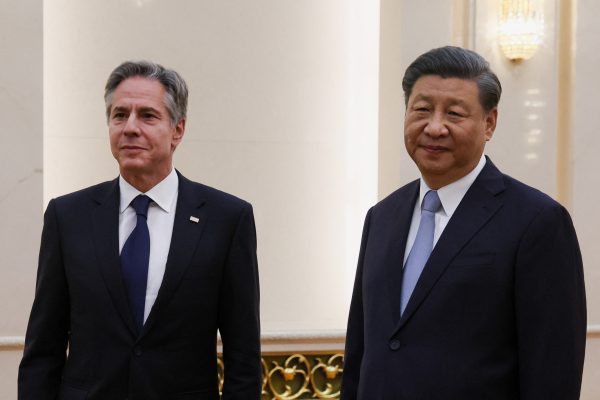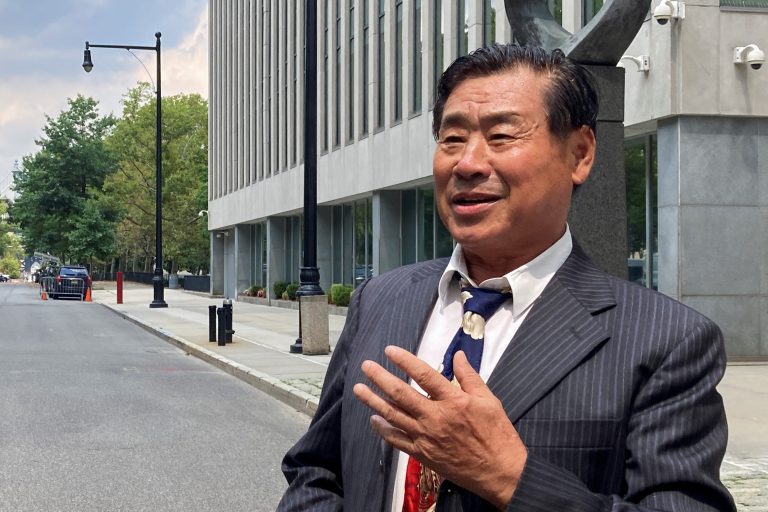The U.S. government has been drafting sanctions on a number of mainland Chinese banks in retaliation for the communist state’s commercial support of the Russian military industry, as reported by the Wall Street Journal on April 22 (Monday), citing individuals familiar with the matter.
American officials have dialed up pressure on the People’s Republic of China (PRC) in recent weeks, warning Beijing that the U.S. was prepared to restrict Chinese financial institutions facilitating trade in goods with dual civilian and military applications.
The Biden administration, including President Joe Biden himself, also named specific fields in which U.S. officials believe the PRC is assisting Russia in its war effort.
But one American official who spoke with Reuters on condition of anonymity said there was no plan to roll out sanctions on Chinese banks in the near-term.
Moreover, Biden administration officials hope that diplomacy will avert the need for such action. Secretary of State Antony Blinken arrived in Beijing — his second trip to the PRC after one made last June — to discuss with his counterparts a range including Taiwan, human rights, and Chinese aid to Russia.
- Biden Proposes Tripling Tariffs on Chinese Steel, Aluminum to Counter Beijing’s Product Dumping
- US Puts Pressure on China as Ukraine War Escalates
- Boeing Whistleblower Says Company’s Entire Fleet ‘Needs Attention’, Recommends All 787 Dreamliner Planes Be Grounded

Success
You are now signed up for our newsletter
Success
Check your email to complete sign up
The war in Ukraine has taken a negative turn for the Ukrainians, with Kyiv losing ground since the failure of their summer 2023 counteroffensive to retake Russian-occupied territory. Additionally, U.S. aid shipments were halted for many months over funding disagreements in Congress; the House and Senate passed bills containing over $60 billion in new aid to Ukraine only on April 23.
Biden signed the legislation, which also contains a bill to divest or ban popular Chinese-owned social media app TikTok, into law on April 24.
Diplomatic approach before financial ‘nuclear’ option
Blinken has criticized Chinese support for Russia’s defense industry, saying Beijing was the key contributor to Moscow’s war in Ukraine through its provision of critical components for weaponry.
China and Russia have fostered more trade in yuan instead of the dollar in the wake of the Ukraine war, potentially shielding their economies from possible U.S. sanctions. The United States and other Western nations imposed sweeping sanctions on Russia’s financial system after Moscow invaded Ukraine in February 2022.
Cutting banks off from access to the dollar — used in much of global trade — is often reserved as a last resort, as such sanctions often force banks into failure.
It would also represent a particular risk for China, amid a sputtering economic recovery and growing debt.
- Over 110,000 Ordered to Evacuate as Guangdong Reels From Catastrophic Floods
- Communist China Heads Down a Road of Isolation and Impoverishment
The Wall Street Journal report did not describe which types of banks might be targeted, a key distinction for how large an impact any such measure would have on China’s economy or its ability to support Russia economically.
The U.S. has sanctioned smaller Chinese banks in the past, such as the Bank of Kunlun, over various issues, including working with Iranian institutions.
But Washington has so far been reluctant to implement sanctions on major Chinese banks — long deemed by analysts as a “nuclear” option — because of the huge ripple effects it could have on the global economy and U.S.-China relations.
According to SinoInsider, a risk consultancy based in New York that specializes in Chinese elite politics, the Biden administration’s “threat of financial sanctions could be a bargaining chip to secure a favorable diplomatic outcome when Secretary Blinken travels to China and meetings with senior PRC officials.”
However, “Washington’s threat of sanctions are unlikely to sway Beijing from backing Moscow. Imposing sanctions would also likely serve to strengthen PRC-Russia ties and embolden Beijing to more openly support Moscow’s war effort,” the SinoInsider analysts wrote in the April 25 edition of their newsletter.
Wang Wenbin, a spokesman for the PRC foreign ministry, said on Tuesday, April 23 that China was “firmly opposed” to the U.S. making “groundless accusations” about Chinese trade with the Russian Federation, saying it was “China’s right to conduct normal economic and trade exchanges with other countries, including Russia.”
“We are firmly opposed to the hypocritical practice of the U.S. side itself pouring fuel but blaming the Chinese side,” Wang said at a regular news briefing when questioned on the possible sanctions.
Several banks in China, the United Arab Emirates and Turkey have boosted their sanctions-compliance requirements, resulting in delays or the rejection of money transfers to Moscow, Reuters reported in March. The delays show how U.S. restrictions can have a strong knock-on effect.
Reuters contributed to this report.







